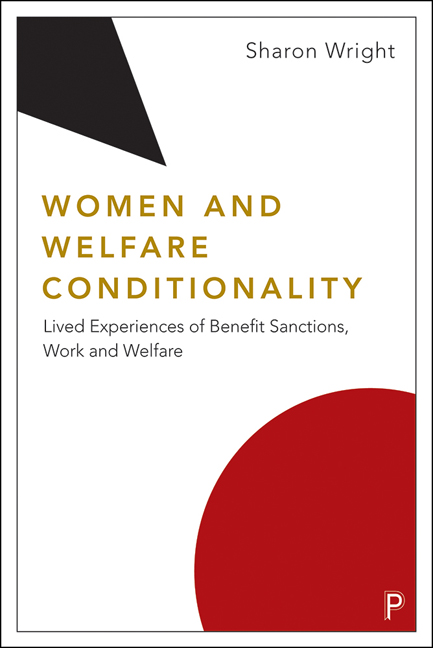Book contents
- Frontmatter
- Contents
- List of figure, tables and charts
- List of abbreviations
- Acknowledgements
- one What does work-based welfare reform mean for women?
- two Re-theorising conditional welfare as gendered lived experience and street-level practice
- three Policy context: the hidden gendered impacts of conditional welfare reforms
- four Rewriting retirement as ‘work experience’: older women’s gendered encounters with the work ethic
- five Crushing conditionality: women living through heavily enforced work-related conditionality
- six In the shadow of sanctions: disciplining women and children for violating male-defined work norms
- seven Conclusions
- Appendix 1 The Welfare Conditionality study
- Appendix 2 Sanctions overviews
- Notes
- References
- Index
Appendix 1 - The Welfare Conditionality study
Published online by Cambridge University Press: 27 March 2024
- Frontmatter
- Contents
- List of figure, tables and charts
- List of abbreviations
- Acknowledgements
- one What does work-based welfare reform mean for women?
- two Re-theorising conditional welfare as gendered lived experience and street-level practice
- three Policy context: the hidden gendered impacts of conditional welfare reforms
- four Rewriting retirement as ‘work experience’: older women’s gendered encounters with the work ethic
- five Crushing conditionality: women living through heavily enforced work-related conditionality
- six In the shadow of sanctions: disciplining women and children for violating male-defined work norms
- seven Conclusions
- Appendix 1 The Welfare Conditionality study
- Appendix 2 Sanctions overviews
- Notes
- References
- Index
Summary
The book is based on qualitative longitudinal research from the ‘Sanctions support and behaviour change: understanding the role and impact of welfare conditionality’ project, funded by the Economic and Social Research Council’s Centres and Large Grants Scheme Grant (2013–19, grant number ES/K002163/2, www.welfareconditionality.ac.uk). The Welfare Conditionality project aimed to create an international and interdisciplinary focal point for social science research on welfare conditionality and brought together teams of researchers in six universities: York, Glasgow, Heriot-Watt, Salford, Sheffield and Sheffield Hallam. The original research questions were:
• How effective is conditionality in changing the behaviour of those receiving welfare benefits and services?
• Are there any circumstances in which the use of behavioural conditionality may, or may not be, justifiable?
This book presents reanalysis of original data generated in interviews from three rounds of innovative repeat qualitative-longitudinal interviews. The full study involved 481 ‘welfare service users’ (1082 interviews in total) subject to a range of conditionality measures in nine policy fields: Universal Credit, job seekers, disabled people, migrants, lone parents, ex-offenders, family intervention, homeless and social tenants. Many of the participants were subject to work-related conditionality while claiming benefits, especially those who were selected because they claimed Universal Credit or Jobseeker’s Allowance. However, other types of behavioural conditionality like antisocial behaviour orders and family intervention projects were included too. This book focuses only on female research participants with experience of social security benefits.
In total, 213 (44 per cent) of the 481 welfare service users who participated in the project self-identified as cisgender women and 268 as cisgender men. Chart A1.1 shows there were higher proportions of women sampled as lone parents (85 per cent) and social tenants (70 per cent). Fewer women were sampled as ex-offenders (21 per cent) and homeless people (27 per cent). The sampling strategy was based on statistical evidence of gender distributions in each of the categories at the start of the study in 2014. Chart A1.2 shows the age distribution of all 481 men and women at the start of the study.
- Type
- Chapter
- Information
- Women and Welfare ConditionalityLived Experiences of Benefit Sanctions, Work and Welfare, pp. 132 - 136Publisher: Bristol University PressPrint publication year: 2023

